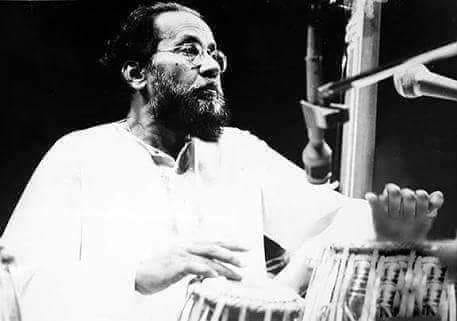Tabla Maestro and Guru Padma Bhushan Pandit Nikhil Ghosh

Remembering Legendary Tabla Maestro and Guru Padma Bhushan Pandit Nikhil Ghosh on his 102nd Birth Anniversary (28 December 1918) ••
Pandit Nikhil Jyoti Ghosh (28 December 1918 – 3 March 1995) was an Indian musician, teacher and writer, known his proficiency on the percussion instrument of Tabla. He founded Sangit Mahabharati, an institution of music in 1956, and performed on various stages in India and abroad. A recipient of the Ustad Hafiz Ali Khan Award, his style was known to have been aligned with the Delhi, Ajrada, Farukhabad, Lucknow and Punjab gharanas of Tabla. The Government of India awarded him the third highest civilian honour of the Padma Bhushan, in 1990, for his contributions to Music.
• Biography :
Pandit Nikhil Ghosh was born on 28 December 1918 at Barisal, a small village in East Bengal (present-day Bangladesh) in British India as the younger brother of Pandit Pannalal Ghosh, a known flautist of Hindustani classical music.
After early training in music from his father, Pt. Akshay Kumar Ghosh, who was a locally known sitarist, he trained in Vocals and Tabla under several noted musicians such as Ustad Ahmed Jan Thirakwa, Ustad Amir Hussain Khan and Pandit Jnan Prakash Ghosh, and started performing on stage accompanying some of the notable musicians of his time, which included Ustad Faiyaz Khan, Ustad Hafiz Ali Khan, Baba Allauddin Khan, Pandit Omkarnath Thakur, Ustad Bade Ghulam Ali Khan, Ustad Amir Khan, Pandit Pannalal Ghosh, Pandit Ravi Shankar, Ustad Ali Akbar Khan, Ustad Vilayat Khan, Pandit Bhimsen Joshi, Pandit Nikhil Banerjee, Pandit Jasraj, Ustad Amjad Ali Khan and Pandit Shiv Kumar Sharma.
Ghosh founded Sangit Mahabharati, a school dedicated for classical music education in 1956. Here, he tutored several aspiring musicians, some of which have already made their names in Indian classical music; Aneesh Pradhan, Eknath Pimple, Datta Yande, Karodilal Bhatt, Gert Wegner and Keith Manning are some of the notable ones among them. He also trained his sons, Nayan Ghosh and Dhruba Ghosh on Tabla and Sarangi respectively as well as his daughter, Tulika Ghosh, on vocals. All of them assist him in teaching at the school.
Ghosh performed on many stages in India and abroad and performed solo at music festivals of Aldeborough (1958), Edinburgh (1958), Bratislava (1980, 1982), Helsinki (1985), Rome (1985), Athens (1985) and at UNESCO, Paris in 1978. He also served as a visiting faculty of music at many universities. He made improvements in the conventional music notation system and wrote a book detailing his system under the title, Fundamentals of Raga and Tala: With a New System of Notation. Later, he also supplemented the book with another Manuscript Book for easy notation. This was followed by the seminal work, The Oxford Encyclopaedia of the Music of India, with author credit going to his music school, Sangit Bharati.
The Government of India awarded him the civilian honor of the Padma Bhushan in 1990 and he received the Ustad Hafiz Ali Khan Award in 1995. He was married to Usha Nayampally, the marriage taking place in 1955. He died on 3 March 1995, at the age of 76, survived by his wife and three children.
On his Birth Anniversary, Hindustani Classical Music And Everything pays rich tributes to the legend and are very grateful for his contributions to the Indian Classical Music.
लेख के प्रकार
- Log in to post comments
- 271 views
